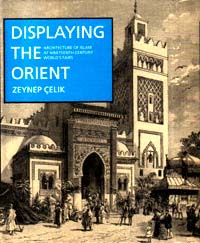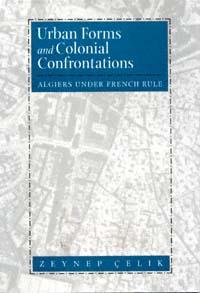formerly eScholarship Editions


|
|
|
|
Your search for
Zeynep
and Çelik
in author
found 2 book(s). | Modify Search | Displaying 1 - 2 of 2 book(s) | |
| 1. |  | Title: Displaying the Orient: architecture of Islam at nineteenth-century world's fairs Author: Çelik , Zeynep Published: University of California Press, 1992 Subjects: Architecture | European History | Cultural Anthropology | Middle Eastern History Publisher's Description: Gathering architectural pieces from all over the world, the Paris Universal Exposition of 1867 introduced to fairgoers the notion of an imaginary journey, a new tourism en place . Through this and similar expositions, the world's cultures were imported to European and American cities as artifacts and presented to nineteenth-century men and women as the world in microcosm, giving a quick and seemingly realistic impression of distant places.Çelik examines the display of Islamic cultures at nineteenth-century world's fairs, focusing on the exposition architecture. She asserts that certain sociopolitical and cultural trends now crucial to our understanding of historical transformations in both the West and the world of Islam were mirrored in the fair's architecture. Furthermore, dominant attitudes toward cross-cultural exchanges were revealed repeatedly in Westerners' responses to these pavilions, in Western architects' interpretations of Islamic stylistic traditions, and in the pavilions' impact in such urban centers.Although the world's fairs claimed to be platforms for peaceful cultural communication, they displayed the world according to a hierarchy based on power relations. Çelik's delineation of this hierarchy in the exposition buildings enables us to understand both the adversarial relations between the West and the Middle East, and the issue of cultural self-definition for Muslim societies of the nineteenth century. [brief] Similar Items |
| 2. |  | Title: Urban forms and colonial confrontations: Algiers under French rule Author: Çelik , Zeynep Published: University of California Press, 1997 Subjects: Architecture | Middle Eastern Studies | Middle Eastern History | French Studies | Postcolonial Studies Publisher's Description: During its long history as the French colonial city par excellence , Algiers was the site of recurrent conflicts between colonizer and colonized. Through architecture and urban forms confrontations were crystallized, cultural identities were defined, and social engineering programs were shaped and challenged. In this pathbreaking book, Zeynep Çelik reads the city of Algiers as the site of social, political, and cultural conflicts during the 132 years of French occupation and argues that architecture and urban forms are integral components of the colonial discourse.Algiers' city planning, based on what Çelik calls "the trial-and-error" model of French colonial urbanism, included the fragmentation of the casbah, ambitious Beaux Arts schemes to create European forms of housing, master plans inspired by high modernism, and comprehensive regional plans. Eventually a dramatic housing shortage led all planning efforts to be centered on the construction of large-scale residential enclaves. French architects based their designs for domestic space on the concept of the "traditional house," itself an interdisciplinary colonial concept intertwined with the discourse on Algerian women. Housing also offered the French colonizers a powerful presence in a country where periodic resistance to the occupation eventually culminated in a seven-year war of liberation and an end to French rule.Extensively illustrated with photographs, maps, and housing plans, Çelik's book presents a fascinating example of colonial urban planning. Algiers comes alive as a city that reflected all the conflicts of colonialism while embracing innovation. [brief] Similar Items |